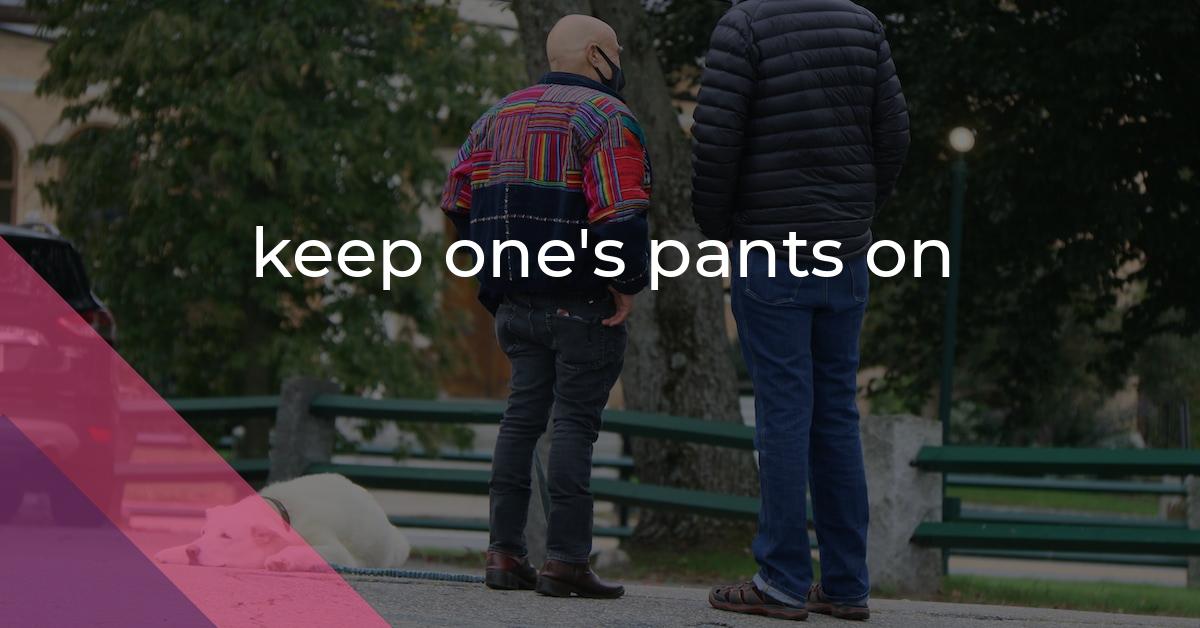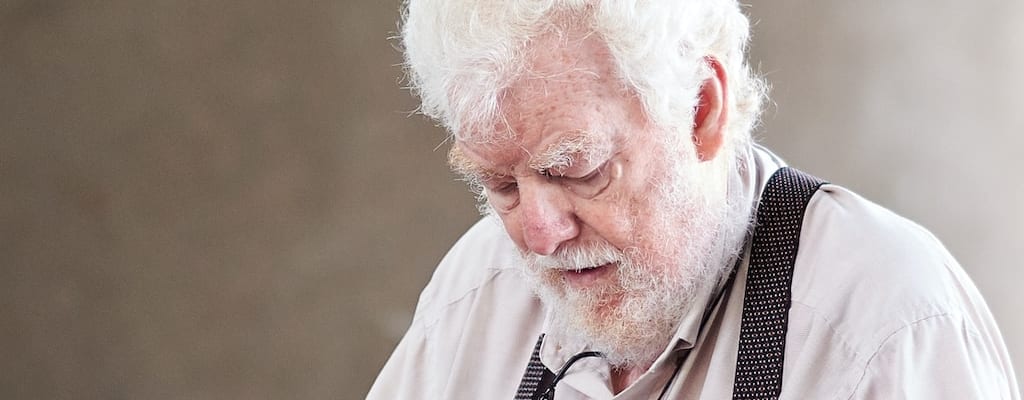keep one’s pants on: Idiom Meaning and Origin
What does ‘keep one's pants on’ mean?
The idiom "keep one's pants on" means to remain calm, patient, or to refrain from becoming overly excited or impulsive in a given situation.

Idiom Explorer
The idiom "keep the peace" means to maintain harmony, calm, and order in a situation or relationship, usually by preventing conflict or resolving disputes.
The idiom "keep someone on their toes" means to keep someone alert, attentive, or prepared for any unexpected situation.
The idiom "keep shtum" means to remain silent or keep quiet about something, especially when it is important or could cause trouble if revealed.
The idiom "keep quiet" means to remain silent or not speak, especially when it is important to do so in order to maintain secrecy, avoid trouble, or not reveal information.
The idiom *keep one's stick on the ice* means to stay focused, alert, and prepared for unexpected events or challenges. It originated from the sport of ice hockey, where players need to always be ready to react to the game's fast-paced nature. Metaphorically, it encourages individuals to always be ready for anything that might come their way.
The idiom "keep one's pecker up" means to remain cheerful and positive in difficult or challenging situations.
The idiom "keep one's mouth shut" means to remain silent or not reveal information, often to avoid causing trouble or trouble for oneself. It emphasizes the importance of not speaking or disclosing something that should remain secret or private.
The idiom "keep one's lips sealed" means to keep quiet or not reveal a secret or confidential information.
The idiom "keep one's knickers on" means to remain calm or patient in a situation where one might feel anxious or impulsive.
The idiom "keep one's head down" means to avoid drawing attention or staying out of trouble in order to stay safe or unnoticed in a dangerous or difficult situation.
Pants On, Patience Steady
keep one's knickers on is another idiomatic phrase that is similar in meaning to keep one's pants on. The phrase "keep one's knickers on" is commonly used in British English and is used to advise someone to remain calm and patient in a given situation. It conveys the message that it is important to keep one's composure and not get overly excited or agitated. This idiom is often used in informal conversations or playful exchanges to remind someone to stay calm and collected.
Similarly, the idiom "keep one's hair on" is also used to convey a similar meaning. This expression is commonly used in British English and is used to caution someone against getting angry or losing their temper. It emphasizes the importance of remaining calm and composed in challenging or frustrating situations. By using this idiom, speakers aim to diffuse tension and encourage a more level-headed approach to problem-solving or conflict resolution.
Another related idiom is "keep one's cool." This phrase is used to advise someone to remain calm and composed, especially in stressful or challenging situations. It emphasizes the importance of maintaining a clear and rational mindset, even when faced with difficulties or obstacles. By using this idiom, speakers encourage others to avoid getting overwhelmed or losing control of their emotions. Keeping one's cool enables individuals to think clearly and make sound decisions, even in high-pressure situations.
The idiom "keep one's pants on" and its related expressions, "keep one's knickers on," "keep one's hair on," and "keep one's cool," all share a common theme of advising individuals to remain calm, patient, and composed in various situations. These idioms serve as reminders to avoid rushing into actions or getting overly excited or agitated. Each idiom is specific to its cultural context, with "keep one's knickers on" being commonly used in British English and "keep one's hair on" being a variation of the idiom in the same context. "Keep one's cool" is a more general expression that can be used in various English-speaking countries. Despite their cultural differences, these idioms convey similar messages about the importance of self-control and maintaining composure.
The figurative nature of these idioms adds color and depth to conversations, offering a playful or humorous tone. These expressions are not meant to be taken literally, as they focus more on the emotional or psychological aspects of maintaining composure. By using these idioms, speakers engage their audience and convey subtle messages, encouraging them to approach situations with patience, restraint, and a level-headed mindset.
The idiom "keep one's pants on" and its related expressions, "keep one's knickers on," "keep one's hair on," and "keep one's cool," all serve as reminders to remain calm, patient, and composed in various situations. These idioms convey messages about the importance of self-control, restraint, and maintaining a level-headed mindset. Whether used in formal or informal contexts, these idiomatic expressions add depth and color to conversations, engaging listeners and conveying subtle messages about emotional composure. Despite their cultural variations, these idioms share a common theme and purpose, offering advice and guidance on maintaining composure in the face of excitement, agitation, or frustration.
Example usage
Examples of how the idiom "keep one's pants on" can be used in a sentence are:
- He needs to keep his pants on and not make any impulsive decisions.
- I told them to keep their pants on and wait for the official announcement.
- She couldn't keep her pants on and blurted out the secret before anyone else.
More "Patience" idioms



